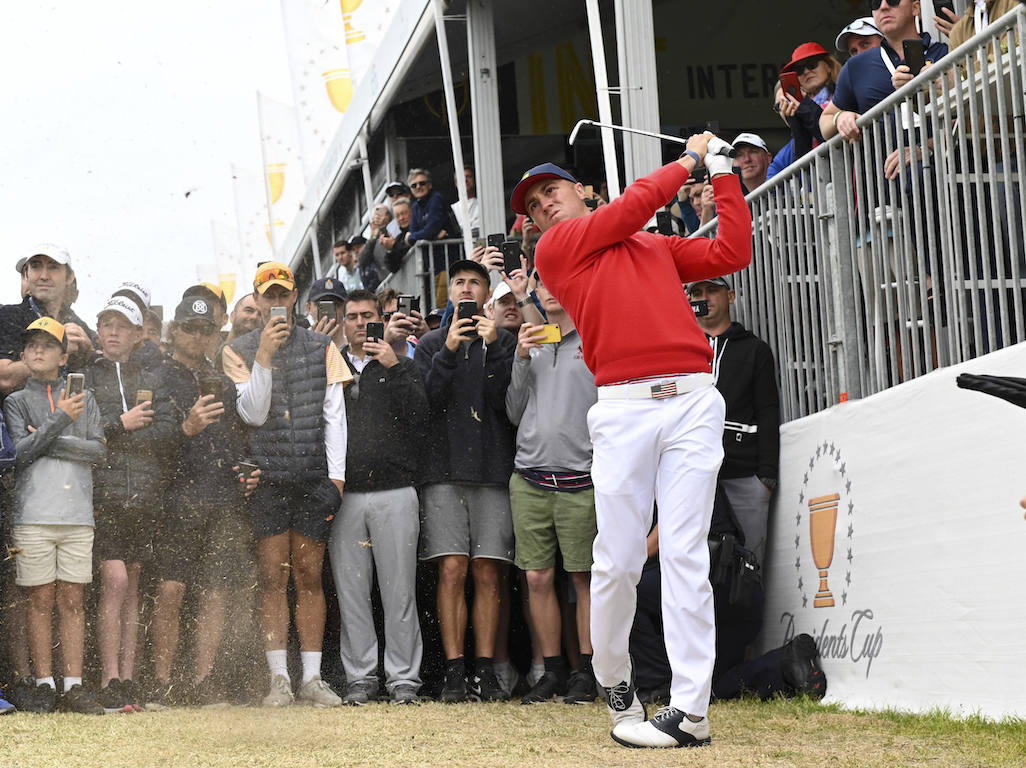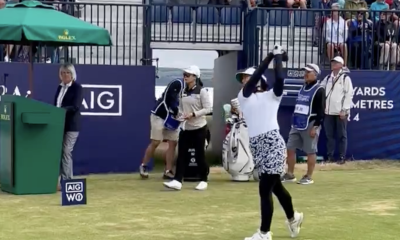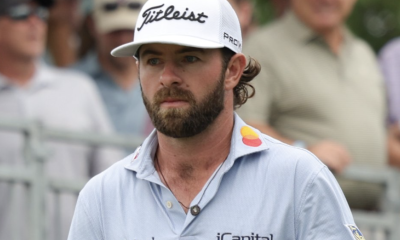Opinion & Analysis
No fans, no caddies: How will PGA Tour pros do on their own?

How many of you have ever wondered just how many strokes the gallery and the caddie save a tour pro? Well, we may get an answer to that soon. The PGA Tour has already announced that the first four (at least) events will be played without a gallery, and they are also considering whether or not to allow the players to use a caddie!
Let’s take the disease factor out of this discussion; the human suffering we are all feeling is not what I’m discussing here. I’m more than a little curious to see just how many shots per round, or per four-day event the gallery and the caddie help the score of a player. We can be sure of this: they never hurt. The combination of the crowd and the advice of a caddie clearly serve to help a player. The question is: how much? Perhaps it’s considerable, maybe it’s marginal; but it will be fun to watch to see.
We have all hit errant tee shots or approach shots that end up hitting, say, hardpan or a cart path and gone out of bounds, into someone’s yard, into a pond, or that could not be found at all. When a tour pro hits the occasional foul ball, the five-deep crowd lining the fairway or the green will stop that shot from getting into a deeper hole. So will hospitality tents, TV towers and anything else constructed for the event. The late, great Arnold Palmer was one of the first to recognize this: when in doubt, over-club…somebody is bound to stop the shot.
How often do we see a lost ball on tour? Just think about playing in your weekend four-ball, and you are pretty much out there on your own. You certainly do not have a huge chunk of golfdom or a marshall on every hole running over to look for your slice or hook. At best, you may get a player in the group on the adjacent hole to offer some guidance, but even that is rare.
How about the physical toll on the professionals of toting their own bag? I know they are young and in great shape but it has to have some effect. At 70-plus years, I am well past my physical prime, but I walk and carry as often as I can, and it is a serious five-mile hike that the players likely have not done for many years.
What about club selection, green reading, wind direction, etc.? And remember, the loopers on tour are not just bag toters. They are the creme de la creme of caddies. They may even play the role of swing coach and psychological adviser. Can you imagine a tour pro raking is/her own bunker? Personal rake? No rakes at all? Playing out footprints in the bunkers?
How many have ever had a six-footer and just could not decide on the break or the speed, and therefore missed it? How many have over-clubbed and lost the ball or had an impossible downhill chip off a bare lie (happened to me in Pinehurst twice just today)?
Of course in all fairness, we must admit this: Professional players deserve these advantages. They have all played their way to the top. It is the purest form of competition in that sense. It matters not who one knows, or how fortunate in life one may be, what circumstances he/she were born into…the only thing that matters is the score!
Consider that perhaps 50 million people in the world play golf and less than 500 are making a good living at it! Do that math. No, I’m not questioning the advantages, I’m just wondering how the big guys will fare playing the same game as the rest of us?
What do you think, GolfWRXers?
Opinion & Analysis
The 2 primary challenges golf equipment companies face

As the editor-in-chief of this website and an observer of the GolfWRX forums and other online golf equipment discourse for over a decade, I’m pretty well attuned to the grunts and grumbles of a significant portion of the golf equipment purchasing spectrum. And before you accuse me of lording above all in some digital ivory tower, I’d like to offer that I worked at golf courses (public and private) for years prior to picking up my pen, so I’m well-versed in the non-degenerate golf equipment consumers out there. I touched (green)grass (retail)!
Complaints about the ills of and related to the OEMs usually follow some version of: Product cycles are too short for real innovation, tour equipment isn’t the same as retail (which is largely not true, by the way), too much is invested in marketing and not enough in R&D, top staffer X hasn’t even put the new driver in play, so it’s obviously not superior to the previous generation, prices are too high, and on and on.
Without digging into the merits of any of these claims, which I believe are mostly red herrings, I’d like to bring into view of our rangefinder what I believe to be the two primary difficulties golf equipment companies face.
One: As Terry Koehler, back when he was the CEO of Ben Hogan, told me at the time of the Ft Worth irons launch, if you can’t regularly hit the golf ball in a coin-sized area in the middle of the face, there’s not a ton that iron technology can do for you. Now, this is less true now with respect to irons than when he said it, and is less and less true by degrees as the clubs get larger (utilities, fairways, hybrids, drivers), but there remains a great deal of golf equipment truth in that statement. Think about it — which is to say, in TL;DR fashion, get lessons from a qualified instructor who will teach you about the fundamentals of repeatable impact and how the golf swing works, not just offer band-aid fixes. If you can’t repeatably deliver the golf club to the golf ball in something resembling the manner it was designed for, how can you expect to be getting the most out of the club — put another way, the maximum value from your investment?
Similarly, game improvement equipment can only improve your game if you game it. In other words, get fit for the clubs you ought to be playing rather than filling the bag with the ones you wish you could hit or used to be able to hit. Of course, don’t do this if you don’t care about performance and just want to hit a forged blade while playing off an 18 handicap. That’s absolutely fine. There were plenty of members in clubs back in the day playing Hogan Apex or Mizuno MP-32 irons who had no business doing so from a ballstriking standpoint, but they enjoyed their look, feel, and complementary qualities to their Gatsby hats and cashmere sweaters. Do what brings you a measure of joy in this maddening game.
Now, the second issue. This is not a plea for non-conforming equipment; rather, it is a statement of fact. USGA/R&A limits on every facet of golf equipment are detrimental to golf equipment manufacturers. Sure, you know this, but do you think about it as it applies to almost every element of equipment? A 500cc driver would be inherently more forgiving than a 460cc, as one with a COR measurement in excess of 0.83. 50-inch shafts. Box grooves. And on and on.
Would fewer regulations be objectively bad for the game? Would this erode its soul? Fortunately, that’s beside the point of this exercise, which is merely to point out the facts. The fact, in this case, is that equipment restrictions and regulations are the slaughterbench of an abundance of innovation in the golf equipment space. Is this for the best? Well, now I’ve asked the question twice and might as well give a partial response, I guess my answer to that would be, “It depends on what type of golf you’re playing and who you’re playing it with.”
For my part, I don’t mind embarrassing myself with vintage blades and persimmons chasing after the quasi-spiritual elevation of a well-struck shot, but that’s just me. Plenty of folks don’t give a damn if their grooves are conforming. Plenty of folks think the folks in Liberty Corner ought to add a prison to the museum for such offences. And those are just a few of the considerations for the amateur game — which doesn’t get inside the gallery ropes of the pro game…
Different strokes in the game of golf, in my humble opinion.
Anyway, I believe equipment company engineers are genuinely trying to build better equipment year over year. The marketing departments are trying to find ways to make this equipment appeal to the broadest segment of the golf market possible. All of this against (1) the backdrop of — at least for now — firm product cycles. And golfers who, with their ~15 average handicap (men), for the most part, are not striping the golf ball like Tiger in his prime and seem to have less and less time year over year to practice and improve. (2) Regulations that massively restrict what they’re able to do…
That’s the landscape as I see it and the real headwinds for golf equipment companies. No doubt, there’s more I haven’t considered, but I think the previous is a better — and better faith — point of departure when formulating any serious commentary on the golf equipment world than some of the more cynical and conspiratorial takes I hear.
Agree? Disagree? Think I’m worthy of an Adam Hadwin-esque security guard tackle? Let me know in the comments.
@golfoncbs The infamous Adam Hadwin tackle ? #golf #fyp #canada #pgatour #adamhadwin ? Ghibli-style nostalgic waltz – MaSssuguMusic
Podcasts
Fore Love of Golf: Introducing a new club concept

Episode #16 brings us Cliff McKinney. Cliff is the founder of Old Charlie Golf Club, a new club, and concept, to be built in the Florida panhandle. The model is quite interesting and aims to make great, private golf more affordable. We hope you enjoy the show!
Opinion & Analysis
On Scottie Scheffler wondering ‘What’s the point of winning?’

Last week, I came across a reel from BBC Sport on Instagram featuring Scottie Scheffler speaking to the media ahead of The Open at Royal Portrush. In it, he shared that he often wonders what the point is of wanting to win tournaments so badly — especially when he knows, deep down, that it doesn’t lead to a truly fulfilling life.
View this post on Instagram
“Is it great to be able to win tournaments and to accomplish the things I have in the game of golf? Yeah, it brings tears to my eyes just to think about it because I’ve literally worked my entire life to be good at this sport,” Scheffler said. “To have that kind of sense of accomplishment, I think, is a pretty cool feeling. To get to live out your dreams is very special, but at the end of the day, I’m not out here to inspire the next generation of golfers. I’m not out here to inspire someone to be the best player in the world, because what’s the point?”
Ironically — or perhaps perfectly — he went on to win the claret jug.
That question — what’s the point of winning? — cuts straight to the heart of the human journey.
As someone who’s spent over two decades in the trenches of professional golf, and in deep study of the mental, emotional, and spiritual dimensions of the game, I see Scottie’s inner conflict as a sign of soul evolution in motion.
I came to golf late. I wasn’t a junior standout or college All-American. At 27, I left a steady corporate job to see if I could be on the PGA Tour starting as a 14-handicap, average-length hitter. Over the years, my journey has been defined less by trophies and more by the relentless effort to navigate the deeply inequitable and gated system of professional golf — an effort that ultimately turned inward and helped me evolve as both a golfer and a person.
One perspective that helped me make sense of this inner dissonance around competition and our culture’s tendency to overvalue winning is the idea of soul evolution.
The University of Virginia’s Division of Perceptual Studies has done extensive research on reincarnation, and Netflix’s Surviving Death (Episode 6) explores the topic, too. Whether you take it literally or metaphorically, the idea that we’re on a long arc of growth — from beginner to sage elder — offers a profound perspective.
If you accept the premise literally, then terms like “young soul” and “old soul” start to hold meaning. However, even if we set the word “soul” aside, it’s easy to see that different levels of life experience produce different worldviews.
Newer souls — or people in earlier stages of their development — may be curious and kind but still lack discernment or depth. There is a naivety, and they don’t yet question as deeply, tending to see things in black and white, partly because certainty feels safer than confronting the unknown.
As we gain more experience, we begin to experiment. We test limits. We chase extreme external goals — sometimes at the expense of health, relationships, or inner peace — still operating from hunger, ambition, and the fragility of the ego.
It’s a necessary stage, but often a turbulent and unfulfilling one.
David Duval fell off the map after reaching World No. 1. Bubba Watson had his own “Is this it?” moment with his caddie, Ted Scott, after winning the Masters.
In Aaron Rodgers: Enigma, reflecting on his 2011 Super Bowl win, Rodgers said:
“Now I’ve accomplished the only thing that I really, really wanted to do in my life. Now what? I was like, ‘Did I aim at the wrong thing? Did I spend too much time thinking about stuff that ultimately doesn’t give you true happiness?’”
Jim Carrey once said, “I think everybody should get rich and famous and do everything they ever dreamed of so they can see that it’s not the answer.”
Eventually, though, something shifts.
We begin to see in shades of gray. Winning, dominating, accumulating—these pursuits lose their shine. The rewards feel more fleeting. Living in a constant state of fight-or-flight makes us feel alive, yes, but not happy and joyful.
Compassion begins to replace ambition. Love, presence, and gratitude become more fulfilling than status, profits, or trophies. We crave balance over burnout. Collaboration over competition. Meaning over metrics.
Interestingly, if we zoom out, we can apply this same model to nations and cultures. Countries, like people, have a collective “soul stage” made up of the individuals within them.
Take the United States, for example. I’d place it as a mid-level soul: highly competitive and deeply driven, but still learning emotional maturity. Still uncomfortable with nuance. Still believing that more is always better. Despite its global wins, the U.S. currently ranks just 23rd in happiness (as of 2025). You might liken it to a gifted teenager—bold, eager, and ambitious, but angsty and still figuring out how to live well and in balance. As much as a parent wants to protect their child, sometimes the child has to make their own mistakes to truly grow.
So when Scottie Scheffler wonders what the point of winning is, I don’t see someone losing strength.
I see someone evolving.
He’s beginning to look beyond the leaderboard. Beyond metrics of success that carry a lower vibration. And yet, in a poetic twist, Scheffler did go on to win The Open. But that only reinforces the point: even at the pinnacle, the question remains. And if more of us in the golf and sports world — and in U.S. culture at large — started asking similar questions, we might discover that the more meaningful trophy isn’t about accumulating or beating others at all costs.
It’s about awakening and evolving to something more than winning could ever promise.




















John Shaw
Apr 11, 2021 at 4:12 pm
I think it would be a truer, estimation of the golfer’s, own skill and prowess at the game; without intervention or, help from a caddie. Though, I think they should be afforded an electric conveyance.
John
May 6, 2020 at 11:35 am
I get a chuckle at the modern day sports fan, head buried in the phone..
Kinda sad..
Edward C
May 5, 2020 at 12:47 am
They always say “these guys are good”, maybe we can just find out how good. It will be interesting.
Dennis Clark
May 6, 2020 at 3:25 pm
Yes and it would be great for the game! Huge TV audience IMO. Thx for reading
Aztec
May 4, 2020 at 12:17 pm
Without caddies, will the players be allowed to use rangefinders for yardage? I think this is probably more important than the other considerations.
Dennis Clark
May 6, 2020 at 3:26 pm
Id say yes because, again, we want them to be playing the same game as everyone else.
Dave Teesdale
Apr 2, 2022 at 9:46 pm
We aren’t allowed to use rangefinders in our club matches. What club are you playing at?…
WhoaNe11ie
May 4, 2020 at 10:24 am
I wonder who ClicGear will sign up for endorsements?
#enjoythewalk #trolleyfordollars #morelogos
ChipNRun
May 3, 2020 at 10:43 pm
How much do fans help?
Reminds me of our course marshal meeting with the head pro before the 2014 Walker Cup matches at St. Louis CC. (Amateur women: USA vs. British/Irish)
I asked if any holes were especially challenging for tracking offline shots.
The pro smiled and said if it was a men’s tournament, there were four landing areas that needed extra watching. For a women’s tournament, however, don’t worry.
“If the women miss a shot, it’s probably in the first cut of rough. If the men miss a shot, it goes into never-neverland.”
If Mickelson or McIlroy has a wild tee shot, we’ll see how well they do with the 2-minute search limit.
Jeremy Thompson
May 4, 2020 at 9:33 am
Walker cup is men’s Am, Curtis Cup is women’s Am
Dennis Clark
May 6, 2020 at 3:28 pm
Yep, it WILL be interesting huh?
Martin Barrier
May 3, 2020 at 7:15 pm
The top players will continue to score well maybe even better and players toward the bottom that well be a different store
MadMax
May 3, 2020 at 7:01 pm
Why stop there? They don’t play the same courses we play, every less than perfect area in the fairway is a “ground under repair”. Let’s see how they do in these conditions:
1) Greens: Every green is a different speed, some are wet others dry.
2) Tee boxes: Uneven, some with grass 2 inches long some with none, unfilled divots all over
3) Bunkers: Some with 1/2 inch of what can be considered sand, other with dirt and pebbles, some wet.
4) Fairways: Some cut some not, some soaked some dry, unfilled divots, all rough different depth
5) NO ground under repair
Dennis Clark
May 6, 2020 at 3:30 pm
I agree, send them out to play the local muni-AS IS!!!
Fergie
May 3, 2020 at 6:36 pm
I think not having a caddy is a bit extreme. Social distancing is still possible when you’re passing a club, and caddies could use anti-viral spray when wiping a club. What about spectator-less MLB games? Eliminate the catcher because he’s close to the batter? That would be interesting.
Dr. Fauci
May 5, 2020 at 12:43 pm
Would be a bit rough on the home plate ump, don’t you think?
Dennis Clark
May 6, 2020 at 3:33 pm
Let’s take the Corona factor out of this for a minute…how about we play one of these “on their own” events every year? I’ve like this idea for a long time even pre-COVID. I wrote to PGA Tour about it a while back.
csc
May 3, 2020 at 6:12 pm
I agree that the guys that are near the top of the leaderboard in these tournaments will be playing well that particular week and these circumstances may not be effecting them much at all. However, there will be several players that are not having a good week near the lower end of the scoreboard and those players may very well be effected by these differences. Especially if one of them is having a bad driving week-lost ball penalties will start adding up fast.
Dan
May 3, 2020 at 4:33 pm
The only factor is being very slightly more tired. Caddies barely help score at all.
Also, I’ve gone for 20 rounds in a row with out losing a ball other then in a water hazard. These guys are not exactly 20 cappers out there guys.
John Agel
May 3, 2020 at 11:05 pm
Caddies make a monumental difference and how you play. One way in which this is clearly obvious is that if a player and Caddie are on the verge of divorce, the caddy suddenly becomes an object of great attention as the top players start to jockey around picking up that top caddy. Don’t kid yourself they take care of everything before the shot. Then they lay it all out for the player suggest a shot-which club draw or fade, high low, even picking something to aim at. Player will make a choice knowing that his caddy was on the course at sunup to walk the course, to see how it will play on a given day, where the pins are, you fade when to, because your caddy is look at the hole and the ground surrounding it what is the high part what is the low part, where is the danger, how to play the mounds in and around the green. The player takes all of this as givens he knows the guy has been doing job will then decide, he may with the caddy agree just execute the shot. Talk about it if the player has a different idea for playing the shot you may go with what the guy suggested or what he wants to hit. But the caddy has laid it all out for his man to just chooses idea for the cavities
another really huge part is keeping his man’s head in the game and energized and help him little competitor arrogance. That’s all. Just Carrie the clubs, keep them and golf balls clean. Rake The Bunker you just completely made a mess of then exchange your putter for a
rake…
Stanley
May 3, 2020 at 4:10 pm
I can guarantee that the players in top 10 will not see any difference in their scores. When they are on, nothing can stop them from going low.
chris agel
May 3, 2020 at 2:42 pm
Again, remind me why they cant bifurcate the rules of golf for Tour players. Anyone with any sense knows they play by different “rules” and do not play the same game we play. It would be fun to see them play on their own out there.
Acemandrake
May 3, 2020 at 2:38 pm
My guess is that players that need/want the money will always show up. With or with out a caddy.
They will play well. I’d think that the field scoring average may be a couple of strokes higher than usual.
The wealthier players may take a more casual approach and play less often. Especially the older ones.
NOTE: Brandt Snedeker has said he walks & carries his clubs to get in shape after a layoff.
EJ
May 3, 2020 at 10:58 am
I think you’re missing the point as it’s easy to shoot that number on a home course. Turn up at a tournament and with practice rounds and you’re playing 6 days in a row. You see all the guys out there carrying their own bags 6 days in a row and shooting 20 under par? Some will for sure, but a lot of those guys won’t be able to.
Taylor
May 3, 2020 at 11:35 am
I totally get it but there’s not going to be a huge upshot in scoring. You’re still going to have five six guys that have a chance to win (they’re playing well enough and more importantly putting well enough to win) they’ll still 10 under or better. My point is you’re not going to see Rory, Dustin, Brooks, Jim Herman, Joel Dahmen or whoever struggle to break par. Look at scoring from nationwide events (granted they have loopers) but there’s hardly fans and some aren’t televised (which means no tv and hardly any grandstands) guys going 20 under. My overall point is guys will still play extremely well, some players will struggle without a caddie some might not.
Taylor
May 3, 2020 at 10:51 am
FYI Tiger and Rickie hold the course record of 62 at Medalist. Luke Donald holds (held?) the course record of 64 at Bear’s Club, and 65 at Jupiter Hills. Granted those were in carts, but there was no caddie, no fans, no tv, no grandstands. I think tour players will be just fine